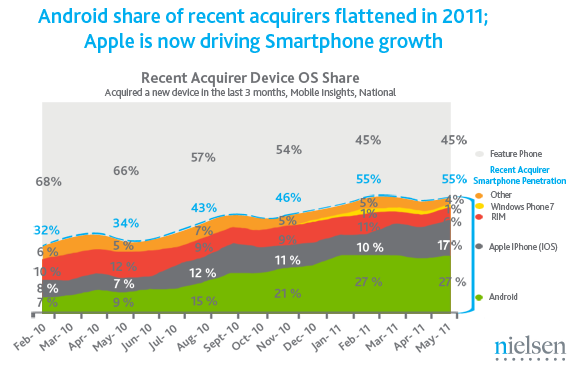
New survey figures released by market metrics firm Nielsen show that Google’s Android operating system remained the most popular smartphone platform in the U.S. market, accounting for 38 percent of smartphone users. However, Nielsen also finds that Android’s adoption by new smartphone buyers over the last few months has remained steady at 27 percent, while Apple’s iPhone has shown steady growth, jumping from 10 percent of new acquirers in February to 17 percent in May. In other words, Apple’s iOS is the only smartphone platform to have shown significant growth in recent months.
Nielsen also finds that 55 percent of mobile users who bought a new phone in recent months have purchased a smartphone—meaning 45 percent of new phone sales were so-called feature phones. A year ago, feature phones accounted for two thirds of new mobile phone purchases.
Industry watchers are attributing the iPhone’s market expansion largely to the device recently going for sale on Verizon Wireless, breaking AT&T’s multi-year exclusivity deal with Apple for the iPhone. However, it’s also worth noting that AT&T has had a minor hit on its hands offering the now two-year-old iPhone 3GS to mid-range buyers for just $50, on a new two-year contract.
Over the same February-to-May period, BlackBerry maker RIM saw its portion of new phone purchases drop from 11 percent to 6 percent, while Windows Phone held relatively steady at one percent.
Nielsen’s figures just account for smartphone sales; they don’t figure in tablets or other non-phone devices running Android or Apple’s iOS.
Editors' Recommendations
- Are you having iPhone alarm problems? A fix is coming soon
- How to find your phone number on iPhone or Android
- Nomad’s new iPhone case and Apple Watch band may be its coolest yet
- The most common Skype problems and how to fix them
- How to find your lost phone (tips for iPhone and Android)


